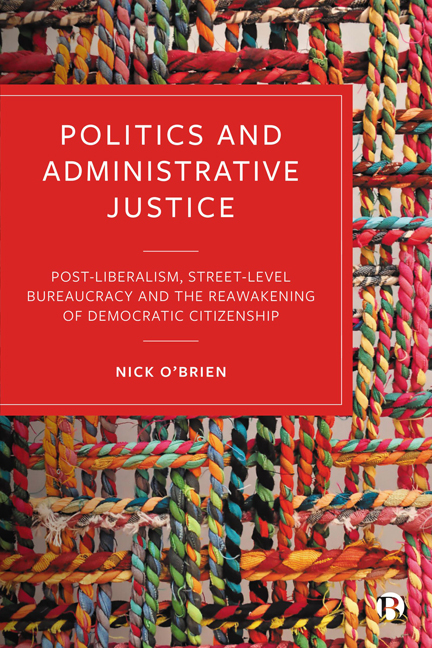 Politics and Administrative Justice
Politics and Administrative Justice Book contents
- Frontmatter
- Dedication
- Contents
- About the Author
- Acknowledgements
- 1 Introduction
- 2 Street-Level Bureaucracy and the Response to Citizen Grievance
- 3 The ‘Social Imaginary’ of Liberal Legalism
- 4 The Promise of Postliberalism
- 5 Citizen Grievance and the Spectre of Legalism
- 6 Postliberal Accountability: The Challenge of Disability Human Rights
- 7 Responding to Grievance: Mental Health and Special Educational Needs and Disability
- 8 Postliberal Administrative Justice
- 9 Conclusion
- References
- Index
4 - The Promise of Postliberalism
Published online by Cambridge University Press: 27 March 2024
- Frontmatter
- Dedication
- Contents
- About the Author
- Acknowledgements
- 1 Introduction
- 2 Street-Level Bureaucracy and the Response to Citizen Grievance
- 3 The ‘Social Imaginary’ of Liberal Legalism
- 4 The Promise of Postliberalism
- 5 Citizen Grievance and the Spectre of Legalism
- 6 Postliberal Accountability: The Challenge of Disability Human Rights
- 7 Responding to Grievance: Mental Health and Special Educational Needs and Disability
- 8 Postliberal Administrative Justice
- 9 Conclusion
- References
- Index
Summary
The association of contemporary liberalism with a legalistic social imaginary makes urgent the task of renewed critique in an era that is characterized as postliberal. Postliberalism as a political stance entails reacquaintance with strands of liberal thought that have slipped from prominence. In particular, it seeks to recognize the state as positive and ethical, and to situate the individual in a complex web of civic association that is a source of both identity and political agency. In the tradition of political pragmatism, it finds a function for response to citizen grievance that is primarily problem-solving and consensus-building rather than adjudicatory. Its imaginative representation, in contrast to that of the judge, resituates the virtue of justice in the company of other virtuous dispositions and as an aspect of the common good.
Postliberal democracy: ‘going on together’
Warnings of liberalism’s demise are hardly new, and indeed the concept of postliberalism by now has a significant pedigree (Gray, 1993). Various forms of communitarian, civic-republican or radical-democratic glosses on liberal themes are well established, including experiments in Third Way and Big Society politics. Indeed, the New Liberalism of L. T. Hobhouse and J. A. Hobson, which in the years before the First World War responded to the new wave of interventionist legislation by developing a positive account of liberty and of the state, might be seen as a precursor of the postliberal adaptation of classical liberalism. Yet events since the financial crash of 2008 and the global pandemic of 2020 have served severely to dent confidence in any prospect of a liberal ‘end of history’ and to intensify debate about alternative projections.
Even before the pandemic, there were insistent reports of the death of liberalism, or at least of the neoliberal form it has taken since 1979. The financial crash of 2008 represented a serious jolt to established assumptions about liberalism’s inevitable hegemony at the endpoint of history. The rising tide since then of populist and nationalist government in western states, has reinforced the suspicion that the neoliberal era of globalization has run its course and that liberal ideology itself is insufficient to meet the challenges of the moment.
- Type
- Chapter
- Information
- Politics and Administrative JusticePostliberalism, Street-Level Bureaucracy and the Reawakening of Democratic Citizenship, pp. 40 - 53Publisher: Bristol University PressPrint publication year: 2023
